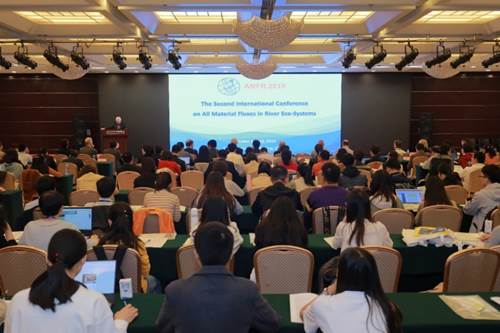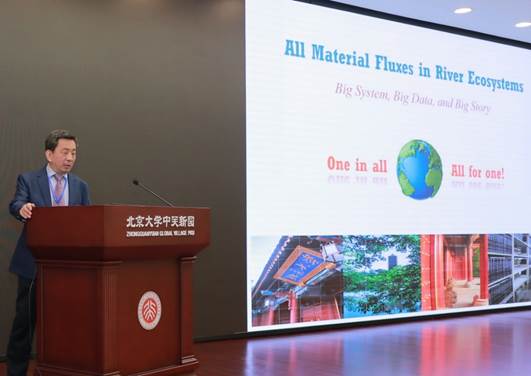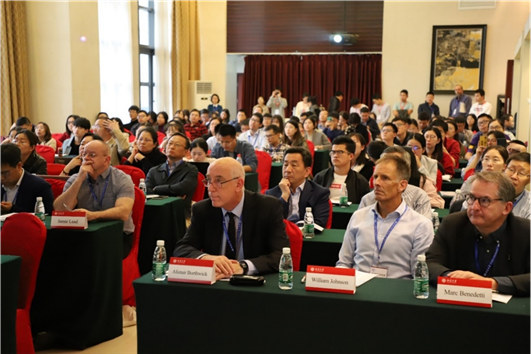The Second International Conference on All Material Fluxes in River Eco-Systems was held at Peking University during October 11-13, 2019. The conference was sponsored by Key Laboratory of Water and Sediment Sciences at Peking University, State Key Laboratory of Hydroscience and Engineering at Tsinghua University, State Environmental Protection Key Laboratory of All Materials Flux in Rivers, State Key Laboratory of Plateau Ecology and Agriculture, Qinghai University, and National Natural Science Foundation of China. Professor Jinren Ni from Peking University and Professor Guangqian Wang from Tsinghua University are chairmen of the conference. More than 230 experts, scholars, and graduate students from more than 10 countries attended the conference. This conference aimed at promoting the exchanges of innovative ideas and new progresses in the study of various substances (including water, sediment, nutrients, trace substances, aquatic organisms and greenhouse gases, etc.) in river ecosystems and their relationships, and explored the key scientific issues and development trends of river material fluxes and river health maintenance.

The opening ceremony was co-chaired by Professor Gregory Korshin from Washington University and Professor Xudong Fu from Tsinghua University. Professor Jinren Ni gave a keynote report entitled “An Introduction of All Material Fluxes in Large River Eco-Systems”, Professor Ni elaborated the concept system, method system, technical system and management system related to “all matter fluxes in river”, introduced the latest progress in the field of research on all matter fluxes in rivers, and looked forward to the prospect of comprehensive management of river basin based on all matter fluxes in rivers. Professor Jean-philippe Croue of Curtin University in Australia introduced the structural properties and environmental effects of colloid and soluble organics, and proposed a new method for separating single organics from natural complex water environment, which provided a new idea for the study of the properties of natural organics in river system. Professor Jizhong Zhou from University of Oklahoma introduced the research progress of using genomics to study the migration and transformation of pollutants in groundwater environment and the function of microbial ecosystem. Professor Jamie Lead from the University of South Carolina described the environmental hazards of synthetic nanoparticles and their migration and transformation in river ecosystems.

The conference sets up five parallel sessions, with more than 130 high-level academic reports, including the invited lectures by more than 40 distinguished experts and scholars from home and abroad. The scholars made thorough discussions and exchanges around the frontier scientific issues of the water and sediment fluxes change and the rivers landscape evolution, biogeochemical transformation of organic matter, pollutants and nutrients. The participants also discussed the trace substances in rivers and their environmental effects, the mechanism of interaction among substances in river systems, greenhouse gases and global climate change, the method systems of river health and risk assessments, the influence of natural and human activities on the river fluxes, monitoring methods of all material fluxes in rivers, and the data acquisition and mining.
The closing ceremony of the conference was chaired by Professor Alistair Borthwick from University of Edinburg and Professor William Johnson from University of Utah. Professor James Tiedje from Michigan State University, Professor Gary Parker from University of Illinois, Professor Gordon Huang from University of Regina, Professor Yuan Zhiguo from University of Queensland, Professor Satoshi Okabe from Hokkaido University, Professor Marc Benedetti from Institut De Physique Du Globe De Paris gave wonderful conference keynote reports.

The conference has been impressed with brilliant academic reports and free discussion atmosphere, which provided a platform for experts and scholars to exchange academic ideas and would promote interdisciplinary research and international cooperation in the field of all material fluxes in rivers.